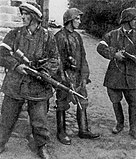| This article does not cite any sources. Please help improve this article by adding citations to reliable sources. Unsourced material may be challenged and removed. Find sources: "Provisional Administration" – news · newspapers · books · scholar · JSTOR (December 2009) (Learn how and when to remove this message) |
| Part of a series on the |
| Polish Underground State |
|---|
 History of Poland 1939–1945 History of Poland 1939–1945 |
| Authorities |
|
Political organizations Major parties Minor parties Opposition |
|
Military organizations Home Army (AK) Mostly integrated with Armed Resistance and Home Army Partially integrated with Armed Resistance and Home Army
Non-integrated but recognizing authority of Armed Resistance and Home Army Opposition |
| Related topics |
Provisional Administration (Polish Administracja Zastępcza) was one of the branches of the Department of Internal Affairs of the Government Delegate’s Office at Home in Poland during World War II.
It was created in 1940 as a joint initiative of the Headquarters of the Armia Krajowa and the Delegate's Office. It was a kind of shadow administration prepared for the moment of either liberation of Poland or the start of an all-national armed uprising.
It was based on the Polish pre-war administrative division, composed of three grades (voivodeship-powiat-gmina), combined with the pre-war military division. In August 1943 the division of competences between the army and the civilian authorities was agreed. The organization of the Provisional Administration was later accepted by the President of Poland on April 26, 1944.
In 1944 during Operation Tempest, as the sole representatives of the legitimate Polish government, the members of the Provisional Administration took power from the withdrawing German troops and welcomed the advancing Red Army . However, most of them were arrested by the NKVD and either sent to Russia for interrogation, sent to the GULag or killed on the spot.
Categories: